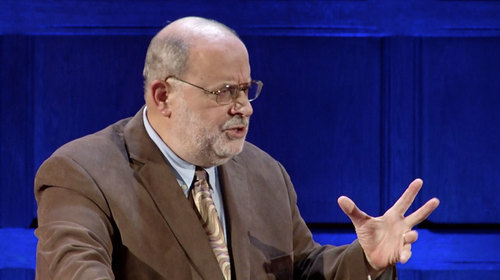At Pulpit & Pen, we’re constantly reporting on the supposed restoration of the sign gifts from God that people are claiming. Recently, we covered the IMB’s embrace of these so-called “gifts” when David Platt re-told a story of a man being “prayed over” by IMB missionaries, and brought back from the dead. Of course, there’s Beth Moore and her fanciful tale of a vision from God telling her to meet a woman at a bus stop and give her money. It comes as no surprise that with the Southern Baptist’s recent acceptance of glossolalia, that the charismatic influence would further infiltrate Evangelicalism, inciting further downgrade.
While Southern Evangelical Seminary, in Charlotte, NC, is not officially a Southern Baptist school, it is, however, very closely tied with the Southern Baptists. Its current president is Richard Land, who is the former president of the Southern Baptist Ethics and Religious Liberties Commission. The seminary often holds its annual Apologetics Conference at local SBC churches and many local Southern Baptists attend the seminary.
At the recent Apologetics Conference, Dr. Barry R. Leventhal, a Messianic Jew and professor of Church Missions and Ministries and Director of the Graduate School of Ministry Program at Southern Evangelical Seminary, told attendees that Jesus still appears to people in dreams, including lost people, and that Jesus appeared to people in dreams during the Holocaust.
As an example, Leventhal shared the testimony of a Jewish man named Joseph who during the Holocaust was forced to work in a Nazi labor camp.
Joseph had sworn vengeance against his Lutheran neighbors who refused to help him and his family.
“He made a vow, a vow of only one thing: He would never stop hating his so-called Christian neighbors. He would always hate their Christian God; their Jesus would be his enemy as long as he lived,” said Leventhal.
“His hatred for Christians and their Jesus grew with each passing day until one dark evening in his bunk, a night that would change Joseph’s life forever, Jesus appeared to Joseph.”
Quoting from Joseph’s testimony, Leventhal recounted that on that night: “Jesus appeared to me. In the darkness of my hatred for Christians and their Jesus, Jesus appeared to me. I recognized Him in a split second, I knew who He was and His first words to me were ‘Joseph, I love you. I died for you. You will survive.'”
Not unusually with these kinds of bizarre recollections, there is no mention of the Gospel being preached or taught. How did Joseph know right away that this was Jesus?
Sure, God can work any way He pleases, but he has made it abundantly clear that His primary means of revealing Himself today is through the preaching of His Word.
For since, in the wisdom of God, the world did not know God through wisdom, it pleased God through the folly of what we preach to save those who believe. – 1 Corinthians 1:21 (ESV)
How then can they call on the One they have not believed in? And how can they believe in the One of whom they have not heard? And how can they hear without someone to preach? And how can they preach unless they are sent? As it is written: “How beautiful are the feet of those who bring good news!” – Romans 10:14-15
So faith comes from hearing, and hearing through the word of Christ. – Romans 10:17
Perhaps this Joseph had heard the Gospel message before, and it was on his mind. That is a possibility. But if this is the case, then why isn’t this a central part of Dr. Leventhal’s message? Why is the emphasis on the supposed dream? How is this verifiable?
According to the Christian Post, Leventhal goes on to support this charismatic extra-biblical nonsense of dream and vision conversions by comparing these tales to the biblical account of Saul’s conversion in Acts. “Saul had a vision of Jesus and from there became a Christian, and changed his name to Paul.”
But does the account of Saul’s conversion really apply to us today? First, we need to ask: what was the purpose of Jesus’ appearing to Saul. In God’s sovereign plan, Saul was a special case. First and foremost, the canon of Scripture was still wide open at the time, as Paul is the author of at least 13 of the 27 New Testament books. The sign gifts were still fully in effect. During the closing of the canon, we see the gifts (i.e. revelations, miracles, tongues, etc.) tapering off, and the preaching of the Word of God becoming the dominant form evangelism (1 Cor. 13:8-13). The church was built on the foundation of the Apostles and Prophets, with Jesus as the chief cornerstone (Eph 2:20). Currently, that foundation has already been laid. God has already spoken to us through his Son, Jesus, and is forever revealed to us through his Word (Heb 1:1-2). Further, Jude 3 states that the faith has been once and for all delivered to us–it does not say that it is still being delivered to us.
So there is no reason to lend any credence to these tales of dreams and visions. Again, God can work how he pleases, but he has chosen to reveal himself to us through the Scriptures. The typical argument is that by rejecting these stories, we are “putting God in a box.” These claims of ongoing revelation, in reality, are what puts Him in the box. It is a denial of God’s divine election and sovereign ability to send his Word to those who He has chosen to reveal Himself to.
Is God not powerful enough to send someone to proclaim His Son’s name to the far reaches of the earth?
But you will receive power when the Holy Spirit has come upon you, and you will be my witnesses in Jerusalem and in all Judea and Samaria, and to the end of the earth.” – Acts 1:8
[Contributed by Pulpit & Pen]










